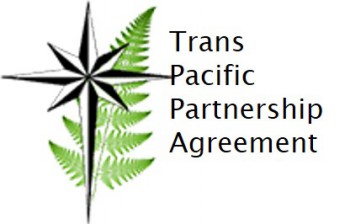A Dominican responds about the Trans Pacific Partnership Agreement
Pat Neuwelt
9 Sept 2015
Why should we Dominicans be concerned with current international trade and investment agreements between New Zealand and other nations? I asked myself a similar question about 3 years ago ‘ Why should an academic physician worry herself about the Trans Pacific Partnership Agreement?’ Once I opened myself to listening to the wisdom of women and men (in NZ, Australia and elsewhere) who could answer that question for me, I began to realize that I had no choice but to concern myself. In fact, in the journey into this area of work (yes, it is now an area of research, writing and advocacy for me), has taken me into topics that used to frighten my simple brain: political economy, globalization, neo-colonialism, corporate transnationalism! So, in simple terms, what have I learned?
Colonisation has always been about domination of one set of people over another, and about capturing resources – whether spices, minerals, or oil. Imperial nation states were always supporting the establishment of companies in the colonies – such as the Hudson’s Bay Company in Canada or the New Zealand Company in Aotearoa. In current times, the story is similar only the stakes are different. Large, wealthy companies, although based in a ‘home nation’, are actually transnational – and are operating across the globe from bases in the United States, Canada, the UK or European countries. They are operating beyond the legal domain of their home nation, and have to abide by international laws. In international trade, they must abide by the laws put in place by the World Trade Organisation.
However, many transnational companies (driven by the profit-imperative) want less restriction on their ability to export to other nations (and, conversely, more restriction on nations who regulate their products). For example, they want more rights than the World Trade Organisation has allowed them to date. Countries have engaged in bilateral (2 countries) or multilateral (>2 countries) negotiations towards trade and investment agreements that aim to extend corporate rights particularly with regard to intellectual property rights.
Major pharmaceutical companies, which produce medicines and medical devices, are one example of major companies that are transnational and want more protection of their ‘corporate rights’. Tobacco companies are another example. Companies that produce and sell alcohol are another. Health insurance companies are another. These transnational corporations are powerful in influencing political processes, and lobby their home governments very hard for international trade regulations that will allow them to continually increase their profits. In New Zealand, Fonterra and dairy exports have become a major focus for our government. In the US, the corporate influence is much, much wider.
As one example, I’ve been studying the ways that the pharmaceutical industry (major patent-holding transnational corporations) has influenced the Trans Pacific Partnership Agreement (TPPA) – which is currently under negotiation between our government and the governments of 11 other ‘Pacific Rim’ nations. It is the largest ever economic treaty in history, involving countries that cover 40% of global GDP. It is setting a precedent for subsequent trade agreements, such as the one being negotiated between the US and the European Union currently.
The ‘deal’ may be signed any day, and once this deal is signed it cannot be reversed through our parliamentary processes. The next government we vote into parliament will be ‘stuck with it’! The TPPA is considered a new type of trade and investment agreement, as its focus is not border tariffs (as in ‘old style’ free trade agreements) but policy decisions made within borders. In other words, the focus of this very complex set of agreements is on what governments can and cannot do within their own borders! These newer trade agreements are more about enabling transnational companies to influence legislative and other regulatory processes within countries, in order to ensure corporate profits are not limited in any way. And these trade agreements have been negotiated in SECRET, with negotiation details not even available to parliamentarians let alone the public. What we know about the TPPA, for example, is based only on ‘leaked’ texts – and they are partial. The TPP agreement is about 30 chapters long, and hundreds of pages in length.
International trade agreements do not have to be negotiated with such extreme secrecy, despite the government rhetoric about the need for secrecy. In fact, the Chilean government has chosen to make some of the TPP text available for public scrutiny, to enable discussion and civil society input. With regard to the TTIP, the EU Commission has agreed that the negotiations are going far beyond simply border tariffs and into questions of national sovereignty – and so has committed to releasing some of the text for public discussion and debate.
I’ll now return to the example of medicines and transnational pharmaceutical companies. Since 2000 in New Zealand, we’ve had a Pharmaceutical Management Agency (called PHARMAC) responsible for purchasing medicines on behalf of government. PHARMAC has reduced the costs of medicines in New Zealand since that time, making them more affordable for both the health system and individual patients and families. PHARMAC made an estimated $5billion saving over twelve years (2000-2012) through its effective pricing mechanisms. They have enabled very expensive patented medicines to be replaced by much cheaper generic medicines, once patent terms on those medicines expire. PHARMAC is seen by other governments as a model that they aspire to implement – in order to reduce the burgeoning costs of medicines in their own countries. As a result, patent-holding pharmaceutical companies use many techniques to try to force PHARMAC’s decision-making processes to change. They are not happy at all about the potential loss of profits if other, larger countries adopt the PHARMAC model.
Within the TPPA, there is evidence of many ways that these major pharmaceutical companies are pushing to increase their monopolies on medicines. Our government has already agreed to some of these changes in patent terms. As a result, there is evidence that the TPPA will limit PHARMAC’s ability to keep the costs of medicines in New Zealand affordable. Increased medicines monopolies, due to the TPPA, will also affect poorer nations such as Vietnam; nations which already lack the funding to buy essential medicines for their whole population.
A further major concern about the TPPA is that it includes provisions allowing a corporation to sue a government if a government puts in place a policy or law that limits that company’s profits. I’m referring here to Investor (the company) State (the government) Disputes. These ‘ISDS’ processes occur outside of national or international law. Tribunals meet, on an ad hoc basis, to ‘try the cases’ whenever corporations choose to take a case against a government. There is no transparency about these processes, and there is no appeal process for governments. As an example, a drug company has sued the Canadian government for $500 million dollars.
Such legal action has been skyrocketing in the past 10-15 years, with a large number of cases (over 100 by 2013) having been taken by companies based in the US. There are now a growing number of lawsuits against governments for making decisions that corporations don’t like. A large number of these have limited attempts by developed and developing nations to reduce environmental degradation. Governments have been sued, or been threatened with being sued, by corporations for:
- Regulating for tobacco plain packaging (the NZ government has said it won’t progress with this here until they see what happens with the current ISDS lawsuit against the Australian government by a trans national tobacco company for its plain packaging legislation!)
- Regulating to limit mining operations to protect the environment and even basic water supplies;
- Regulating to reduce carbon emissions, or to move towards more sustainable forms of energy production (away from coal or nuclear-based);
- Regulating to limit drug patents in order to allow cheaper generic medicines onto the market.
Even the threat of being sued is enough to convince a government to back off putting in place legislation to protect its own population.
To summarise: The TPPA has the potential to influence many aspects of life in New Zealand, and around the Pacific Rim. That’s why we, as Dominicans, should be aware, be concerned, and be active about international trade agreements. They are part of neoliberal political ideology, that focuses on the individual (and individual responsibility) at the expense of the collective (and social justice). The impacts of trade agreements such as the TPPA will hit hardest those who are already poor and marginalized. The Common Good is what is at risk.
What can we do? People are starting to wake up, around TPPA nations, to the anti-democratic nature of the TPPA negotiations. However, many New Zealanders still lack even a basic understanding of what the TPPA is about. Why? Because there has been so much secrecy, and so little information provided. Many of us are already actively signing petitions, joining protest marches, and sharing information via social media. Some of us are holding these issues close in our daily meditation or prayer time.
The more we bring these issues into our day-to-day conversations, and speak within our homes and our communities about them, the more chance we all have of working collectively for positive social change. The actions we take, however seemingly small, all contribute to the wider movement for social justice. They are actions that ‘speak truth to power’.








